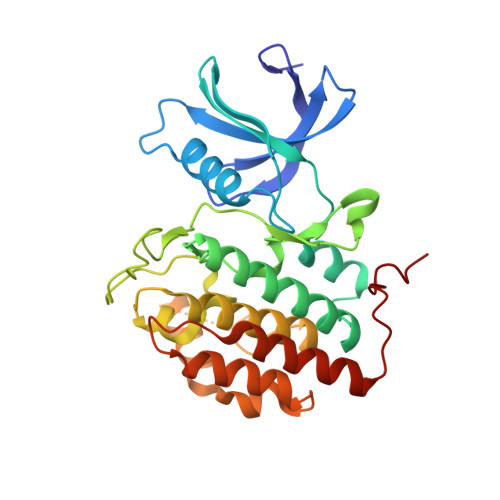Epiblastin A Induces Reprogramming of Epiblast Stem Cells Into Embryonic Stem Cells by Inhibition of Casein Kinase 1.
Ursu, A., Illich, D.J., Takemoto, Y., Porfetye, A.T., Zhang, M., Brockmeyer, A., Janning, P., Watanabe, N., Osada, H., Vetter, I.R., Ziegler, S., Scholer, H.R., Waldmann, H.(2016) Cell Chem Biol 23: 494-507
- PubMed: 27049670
- DOI: https://doi.org/10.1016/j.chembiol.2016.02.015
- Primary Citation of Related Structures:
5IH4, 5IH5, 5IH6 - PubMed Abstract:
The discovery of novel small molecules that induce stem cell reprogramming and give efficient access to pluripotent stem cells is of major importance for potential therapeutic applications and may reveal novel insights into the factors controlling pluripotency. Chemical reprogramming of mouse epiblast stem cells (EpiSCs) into cells corresponding to embryonic stem cells (cESCs) is an inefficient process. In order to identify small molecules that promote this cellular transition, we analyzed the LOPAC library in a phenotypic screen monitoring Oct4-GFP expression and identified triamterene (TR) as initial hit. Synthesis of a TR-derived compound collection and investigation for reprogramming of EpiSCs into cESCs identified casein kinases 1 (CK1) α/δ/ɛ as responsible cellular targets of TR and unraveled the structural parameters that determine reprogramming. Delineation of a structure-activity relationship led to the development of Epiblastin A, which engages CK1 isoenzymes in cell lysate and induces efficient conversion of EpiSCs into cESCs.
- Department of Chemical Biology, Max Planck Institute of Molecular Physiology, Otto-Hahn-Strasse 11, 44227 Dortmund, Germany; Chemical Biology, Faculty of Chemistry and Chemical Biology, Technical University Dortmund, Otto-Hahn-Strasse 6, 44221 Dortmund, Germany.
Organizational Affiliation:




















